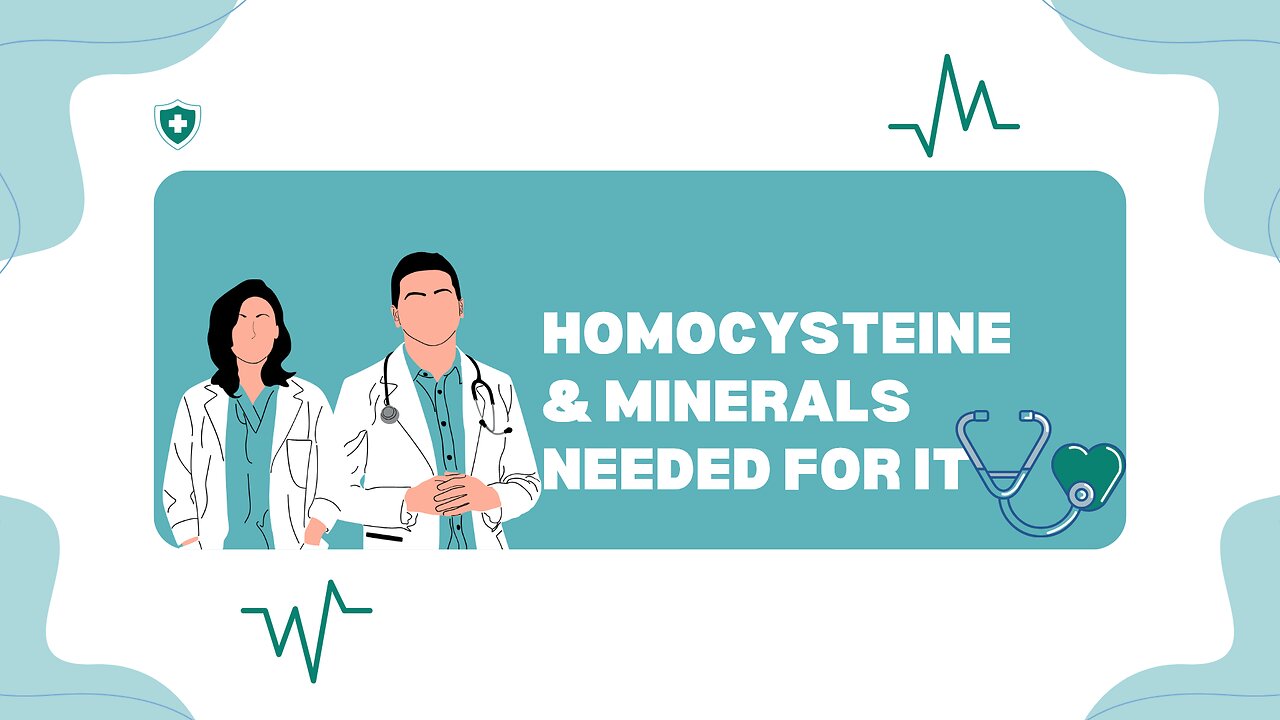Premium Only Content

minerals needed for HOMOCYSTEINE
Homocysteine: What It Is, Health Risks, and How to Manage Levels
Homocysteine is an amino acid produced in the body during the metabolism of methionine, an essential amino acid found in protein-rich foods. While naturally occurring, elevated homocysteine levels (a condition known as hyperhomocysteinemia) have been linked to increased risks of cardiovascular disease, stroke, dementia, and other chronic health issues. High homocysteine can damage blood vessels, promote blood clot formation, and impair cognitive health over time.
Factors that may contribute to elevated homocysteine include genetic mutations (MTHFR gene), vitamin B6, B12, and folate deficiencies, poor diet, smoking, excessive alcohol intake, and chronic stress. Testing homocysteine levels can provide insight into cardiovascular and neurological risk, making it an important biomarker for preventive health.
Fortunately, lifestyle and dietary changes can help regulate homocysteine. Consuming foods rich in folate (leafy greens, legumes), vitamin B6 (bananas, poultry, fish), and vitamin B12 (eggs, dairy, meat, fortified foods) can lower levels naturally. Supplements may also be beneficial for individuals with deficiencies or genetic predispositions.
Understanding homocysteine and maintaining healthy levels can support heart health, brain function, and overall longevity.
Keywords & LSI Variations for SEO: homocysteine levels, hyperhomocysteinemia, MTHFR mutation, folate deficiency, vitamin B12 and homocysteine, cardiovascular risk marker, homocysteine and dementia, natural ways to lower homocysteine.
-
 23:22
23:22
Stephen Gardner
1 day ago🚨BREAKING: Mamdani Won and What Trump EXPOSES About It is SHOCKING!!
37.1K139 -
 1:16:41
1:16:41
Steve-O's Wild Ride! Podcast
21 hours ago $0.06 earnedAdam Ray Absolutely Kills Steve-O | Wild Ride #273
28.4K5 -
 37:22
37:22
efenigson
1 day agoWhat COVID Taught Me About Money & Control - Efrat Fenigson | Ep. 104
23.2K4 -
 1:20:56
1:20:56
Dialogue works
2 days ago $0.55 earnedCol. Larry Wilkerson: No Way Out for Israel - Iran & Russia — NATO’s Worst Fear
43.9K14 -
 10:37
10:37
TheSaltyCracker
20 hours agoMassive Brawl Breaks Out in Bass Pro Shop Over Bathroom
55.1K164 -
 16:40
16:40
Actual Justice Warrior
17 hours agoSydney Sweeney REFUSES To Apologize For Being White
38.2K49 -
 1:57:23
1:57:23
MG Show
22 hours agoTrump Makes Announcement; Erika Kirk 1st Interview
38.8K48 -
 8:01
8:01
MattMorseTV
15 hours ago $0.79 earnedTrump just GUTTED the ENTIRE SYSTEM.
84.5K110 -
 20:02
20:02
Nikko Ortiz
16 hours agoBlades And Sorcery Is The Ultimate Medieval Fantasy
23.9K6 -
 2:12:18
2:12:18
Side Scrollers Podcast
1 day agoSide Scrollers VTuber TAKE OVER with Kirsche, Rev Says Desu & DarlingStrawb | Side Scrollers
104K19